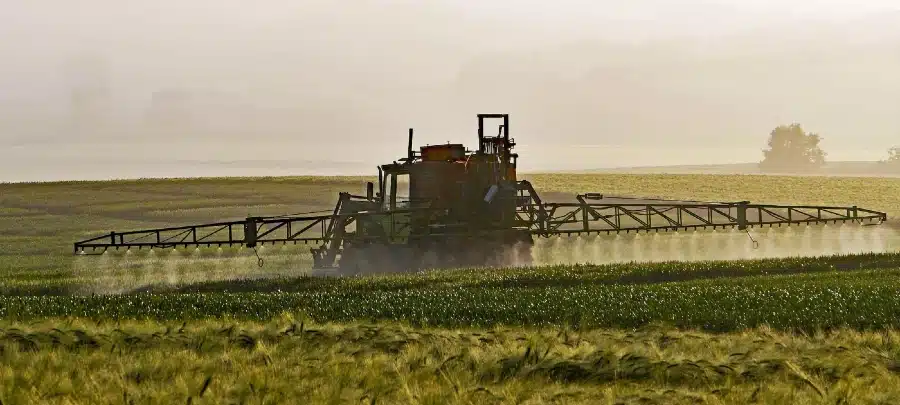Equador e Uruguai combatem a poluição e os impactos tóxicos da agricultura

Em um esforço conjunto para lidar com a questão generalizada da poluição agrícola, os governos do Equador, Índia, Quênia, Laos, Filipinas, Uruguai e Vietnã se uniram para lançar uma iniciativa substancial de US$379 milhões. Essa iniciativa tem como objetivo abordar os riscos ambientais e de saúde representados pelo uso extensivo de pesticidas e plásticos na agricultura.
Produtos químicos como pesticidas e plásticos agrícolas são parte integrante das práticas agrícolas modernas, contribuindo significativamente para a produção de alimentos. No entanto, a escala alarmante de seu uso - cerca de 4 bilhões de toneladas de pesticidas e 12 bilhões de quilos de plásticos agrícolas por ano - traz consequências substanciais.
O impacto prejudicial desses produtos químicos sobre a saúde humana e o meio ambiente não pode ser subestimado. Anualmente, aproximadamente 11.000 vidas são perdidas devido aos efeitos tóxicos dos pesticidas, enquanto os resíduos químicos degradam os ecossistemas, comprometem a saúde do solo e reduzem a resistência dos agricultores às mudanças climáticas. Além disso, a queima de plásticos agrícolas agrava a crise global de poluição do ar, contribuindo para uma em cada nove mortes em todo o mundo.
Não perca essa chance! Assine nosso boletim informativo para receber o conteúdo mais recente diretamente em sua caixa de entrada ou registro GRATUITAMENTE para obter acesso total.
Particularmente preocupantes são os pesticidas altamente perigosos e os plásticos agrícolas mal administrados, que liberam poluentes orgânicos persistentes (POPs) tóxicos. Esses produtos químicos persistem no meio ambiente, contaminando o ar, a água e os suprimentos de alimentos. Apesar de seus efeitos adversos, esses insumos continuam populares devido aos seus custos mais baixos em comparação com alternativas sustentáveis, o que representa um desafio significativo para incentivar a adoção generalizada de melhores práticas.
O Programa de Financiamento da Redução e Gestão de Agroquímicos (FARM), liderado pelo Programa das Nações Unidas para o Meio Ambiente (PNUMA) com o apoio financeiro do Fundo Global para o Meio Ambiente (GEF), busca enfrentar esses desafios. Em um período de cinco anos, o FARM pretende evitar a liberação de mais de 51.000 toneladas de pesticidas perigosos e mais de 20.000 toneladas de resíduos plásticos. Além disso, prevê evitar 35.000 toneladas de emissões de dióxido de carbono e proteger mais de 3 milhões de hectares de terra contra a degradação, à medida que as fazendas fazem a transição para alternativas com baixo teor químico e não químicas.
Anil Sookdeo, Coordenador de Produtos Químicos do GEF, enfatiza a importância da transição para longe dos produtos químicos nocivos, afirmando: "Nosso sistema agrícola atual depende de produtos químicos nocivos, o que não é necessário. O FARM oferece um modelo alternativo poderoso, capacitando os agricultores com o conhecimento e os recursos para fazer a transição para práticas sustentáveis que protegem nossa saúde e o meio ambiente e também aumentam a produtividade e os lucros."
Para atingir seus objetivos, o programa FARM defenderá as regulamentações governamentais para eliminar gradualmente os agroquímicos e agroplásticos que contêm POPs, além de promover melhores padrões de gerenciamento. Além disso, trabalhará para aprimorar os critérios de bancos, seguros e investimentos para facilitar a adoção de controle eficaz de pragas, alternativas de produção e comércio de produtos sustentáveis.
Sheila Aggarwal-Khan, diretora da Divisão de Indústria e Economia do PNUMA, ressalta a necessidade de adotar alternativas mais seguras aos pesticidas altamente perigosos, afirmando: "A produtividade e a segurança dos alimentos dependem da identificação de melhores práticas e alternativas mais seguras aos pesticidas altamente perigosos. A adoção é fundamental para ampliar essas alternativas. Não há outra opção real a não ser uma resposta forte e coordenada à crise de poluição".
O evento de lançamento do programa FARM reuniu representantes de todos os sete países participantes, além de mais de 100 parceiros e partes interessadas diretamente envolvidas na iniciativa. Esse esforço colaborativo significa um passo significativo no combate à poluição agrícola, promovendo um sistema alimentar mais equitativo e resiliente.
O Programa de Financiamento da Redução e do Manejo de Agroquímicos (FARM) é apoiado pelo Programa das Nações Unidas para o Desenvolvimento, pela Organização das Nações Unidas para o Desenvolvimento Industrial e pelo Banco Africano de Desenvolvimento. Ele representa um esforço vital na luta global contra a poluição agrícola e estabelece um precedente para uma ação conjunta para proteger o meio ambiente e a saúde pública.
(imagem: UNEP/Pixabay)


Respostas